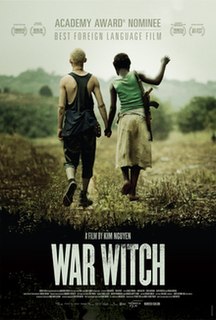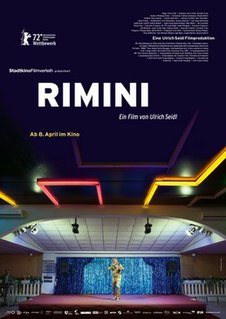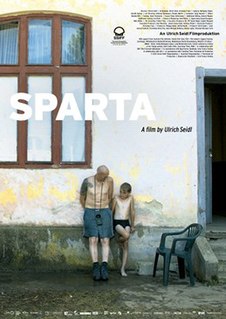
Liv Johanne Ullmann is a Norwegian actress and film director. Recognised as one of the greatest European actresses of all time, Ullmann is known as the muse and frequent partner of filmmaker Ingmar Bergman. She acted in many of his films, including Persona (1966), Cries and Whispers (1972), Scenes from a Marriage (1973), The Passion of Anna (1969), and Autumn Sonata (1978).

Andrzej Witold Wajda was a Polish film and theatre director. Recipient of an Honorary Oscar, the Palme d'Or, as well as Honorary Golden Lion and Honorary Golden Bear Awards, he was a prominent member of the "Polish Film School". He was known especially for his trilogy of war films consisting of A Generation (1955), Kanał (1957) and Ashes and Diamonds (1958).

Danis Tanović is a Bosnian film director and screenwriter. He is best known for having directed and written the script for the 2001 Bosnian movie No Man's Land which won him many awards, including an Academy Award for Best Foreign Language Film and a Golden Globe Award for Best Foreign Language Film among many others.

Breakfast of Champions is a 1999 American satirical black comedy film adapted and directed by Alan Rudolph, from Kurt Vonnegut, Jr.'s 1973 novel of the same name. Though the producers entered it into the 49th Berlin International Film Festival, the film was panned by critics and was a box office bomb that was withdrawn from theatres before going into wide release. It has not yet been given a digital release.

Dog Days is a 2001 Austrian feature film directed by Ulrich Seidl. The film stars a mix of professional and amateur actors and follows six interwoven stories set in suburban Vienna over the course of some unseasonably hot summer days. The film premiered at the 2001 Venice Film Festival where it went on to win the Grand Special Jury Prize and also won awards at the International Film Festival Bratislava and the Gijon International Film Festival.

Ulrich Maria Seidl is an Austrian film director, writer and producer. Among other awards, his film Dog Days won the Grand Jury Prize at Venice in 2001.
Ning Ying is a female Chinese film director often considered a member of China's "Sixth Generation" filmmaker coterie, a group that also includes Jia Zhangke, Zhang Yuan and Wang Xiaoshuai. However, this is more a result of a shared subject matter than anything else, as chronologically, Ning is closer to the earlier Fifth Generation. Her sister, the screenwriter Ning Dai, is a frequent collaborator and the wife of fellow director Zhang Yuan. In 1997, she was a member of the jury at the 47th Berlin International Film Festival.
Anja Salomonowitz is an Austrian film director and screenwriter, specialised on documentary films with political or social background.

Nina Hoss is a German stage and film actress.

Puzzle is a 2010 Argentine drama film directed by Natalia Smirnoff. It was nominated for the Golden Bear at the 60th Berlin International Film Festival.

Paradise is the collective name of three films directed by Ulrich Seidl: Paradise: Love (2012), Paradise: Faith (2012) and Paradise: Hope (2013). They focus on three women from one family; one of them travels to Kenya as a sex tourist, one has to spend time at a weight loss camp, and one tries to propagate Catholicism. The project is an Austrian majority production with co-producers in Germany and France. It was conceived as one feature film, but after a long gestation became three entries forming a trilogy. The first installment, Paradise: Love, competed for the Palme d'Or at the 2012 Cannes Film Festival. Seidl originally planned to premiere all three films at the same event, but after the Cannes selection decided to roll out parts two and three, Paradise: Faith and Paradise: Hope, at other major film festivals. The individual films are named after the three theological virtues, and focus on how the protagonists conceive their view of paradise.
Steven Markovitz is a South African film and television producer. He has produced, co-produced and executive-produced features, documentaries and short films. Steven has been producing and distributing for over 20 years. Since 2007, he has worked all over Africa producing documentary series' and fiction. He is a member of AMPAS, co-founder of Electric South & Encounters Documentary Festival and the founder of the African Screen Network.

War Witch is a 2012 Canadian dramatic war film written and directed by Kim Nguyen and starring Rachel Mwanza, Alain Lino Mic Eli Bastien and Serge Kanyinda. It is about a child soldier forced into a civil war in Africa, and who is believed to be a witch. The film was primarily shot in the Democratic Republic of the Congo in French and Lingala.

Paradise: Love is a 2012 drama film directed by Ulrich Seidl. It tells the story of a 50-year-old white woman who travels to Kenya as a sex tourist. The project is an Austrian production with co-producers in Germany and France. It is the first installment in Seidl's Paradise trilogy, a project first conceived as one film with three parallel stories.

Ludwig Wüst is an Austrian film director, scriptwriter and producer.

Paradise: Faith is a 2012 Austrian drama film directed by Ulrich Seidl, the second in his Paradise trilogy. The film was nominated for the Golden Lion at the 69th Venice International Film Festival and won the Special Jury Prize. It won the award for best sound design at the 26th European Film Awards.

Night Train to Lisbon is a 2013 internationally co-produced English-language drama film directed by Bille August and starring Jeremy Irons. Based on the 2004 novel Night Train to Lisbon by Pascal Mercier and written by Greg Latter and Ulrich Herrmann, the film is about a Swiss teacher who saves the life of a woman and then abandons his teaching career and reserved life to embark on a thrilling intellectual adventure that takes him on a journey to the very heart of himself. The film premiered out of competition at the 63rd Berlin International Film Festival.
Veronika Franz and Severin Fiala are an Austrian filmmaking duo. Fiala is the nephew of Franz and her husband, filmmaker Ulrich Seidl. Franz, a former film journalist, began her film career co-writing with Seidl. Franz and Fiala began their creative partnership writing and directing Kern (2012), a documentary about the actor Peter Kern. They went on to gain international notice for their feature debut, the German-language psychological horror film Goodnight Mommy (2014), which was selected as the Austrian entry for the Best Foreign Language Film at the 88th Academy Awards.

Rimini is a 2022 drama film directed by Ulrich Seidl. It depicts Richie Bravo, a once-famous Austrian pop singer who has settled in Italy, as well as his estranged daughter and his retired father. Hans-Michael Rehberg plays the father, in his last film role. The film is the first in a diptych; the other film, Sparta, is about Richie's brother, Ewald.

Sparta is a 2022 drama film directed by Ulrich Seidl. It depicts an Austrian man named Ewald who is a non-offending pedophile and teaches judo to boys in Romania. The film is the second in a diptych; the other film, Rimini, centres on Ewald's brother.
















